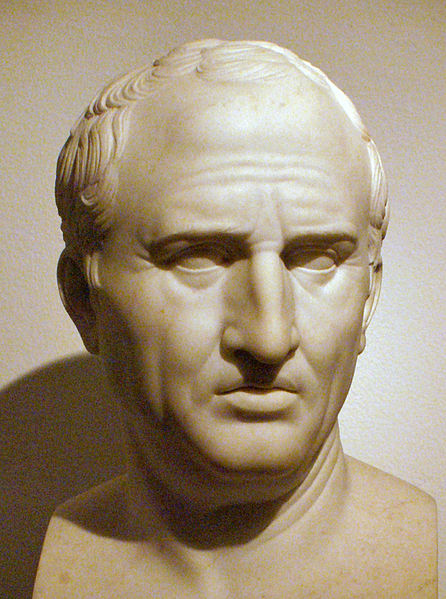
We finally arrive at the last paradox; Paradox VI. That the wise man alone is rich. Cicero gives us his definition, revealed later, on what makes us rich and it’s not the common definition; this is why it has the making of a paradox! I will use the word affluent to describe wealthy in material possessions and money, instead of rich to avoid confusion.
What makes the rich man?
Cicero opens in brief exclamation asking Brutus why does he mention his money in an ostentatious fashion. I guess Brutus told Cicero that he was the ‘only rich man’ which then Cicero further exclaims ‘you are the only rich man! Immortal gods! ought I not to rejoice that I have heard and learned something? You the only rich man!’ (I’m not going to edit the quotations but rich here means affluent)
Cicero shifts gears and posits a scenario on the contrary, what if Brutus was not affluent at all? This sets the stage in the definition of Cicero’s rich man:
“What if you are not rich at all? What if you even are a beggar? For whom are we to understand to be a rich man? To what kind of a man do we apply the term? To the man as I suppose, whose possessions are such that he may be well contented to live liberally, who has no desire, no hankering after, no wish for more. It is your own mind, and not the talk of others, nor your possessions, that must pronounce you to be rich; for it ought to think that nothing is wanting to it, and care for nothing beyond. Is it satiated, or even contented with your money?”
From this paragraph it is here that Cicero defines his rich man and in the typical stoic way of visualising the rich man as it should be: ‘It is your own mind, and not the talk of others, nor your possessions, that must pronounce you to be rich.’ So in a nutshell contentment = rich.
Here the man, even a beggar man, no matter if his possessions are of affluent quantity or scant few, should he be content with what he has without the desire for asking more from life then, this satisfied state of mind is stamped as rich. To drive home the point Cicero is making here, let’s look at this scenario: a man who owns copious amounts of wealth, multiple properties, big houses, cars, CEO of a corporation, high turnover giving him millions in disposable income and all the rest of it. If he’s not content with what he already possess being thirsty to grab for more material things, like a luxurious yacht. Then this tycoon with his grasping covetous unsatisfied mind makes him a poor man.
Cicero goes on with Brutus:
“I admit that you are rich; but if for the greed of money you think no source of profit disgraceful (though your order can not make any honest profits), if you every day are cheating, deceiving, craving, jobbing, poaching, and pilfering; if you rob the allies and plunder the treasury; if you are forever longing for the bequests of friends, or not even waiting for them, but forging them yourself, are such practices the indications of a rich or a needy man? It is the mind, and not the coffers of a man, that is to be accounted rich.”
So in case you didn’t get it! Cicero is banging on again that it is the content stillness of mind and not affluence that makes one rich! It is not the big pile of wealth you have, but that content mental state that asks for neither more nor less; that’s what matters! Cicero would no doubt view the man who not only longs for more material things as poor, but of the man who covets wealth by unethical means or by way of vice, (the opposite of virtue) as doubly poor!
Cicero knew all too well of unethical means of coveting wealth, in his career in law, Cicero at the request of the Sicilians prosecuted Gaius Verres notorious for his draconian and corrupt rule as proconsul of Sicily. Under his reign Verres robbed the Sicilians and plundered their temples of their treasury and stole statues from Roman citizens by means of ‘cheating, deceiving, craving, jobbing, poaching, and pilfering’. All of Verres’ deeds are mentioned in great detail in the account of the trial named ‘Against Verres’ or ‘In Verrem’ (70BC)
The measurement of rich then is ‘the amount of riches by that which is sufficient for each individual’ or to put it another way ‘the degree of wealth is dependent on how much each individual has need of’ with the opposite attitude being needy for more things makes you more poorer in soul!
You’ve the income to raise an army? then you’re affluent!
It seems that there was a standard for measuring those to qualify for the title of being affluent; the standard being if you have an income large enough to raise and maintain an army you are wealthy; how Roman!
“Many have heard you say, that no man is rich who can not with his income maintain an army; a thing which the people of Rome some time ago, with their so great revenues, could scarcely do. Therefore, according to your maxim, you never can be rich, until so much is brought in to you from your estates, that out of it you can maintain six legions, and large auxiliaries of home and foot. You therefore, in fact, confess yourself not to be rich, who are so far short of fulfilling what you desire; you, therefore, have never concealed your poverty, your neediness, and your beggary.”
If you lived in Rome during those times and heard that you must meet this standard in order to join the wealthy boys club and actively believed in this, then you are conforming to a standard someone else created i.e. the income large enough to raise an army idea. This standard, this qualification as to who is wealthy or not, you’ve given up your contentment and peace of mind just to satisfy the guidelines of those people! So until we attain the conditions outlined by this standard then we can never enjoy contentment until then; the stoic attitude says bollocks to all that! we need not chain our mind to conditions outside of ourselves to enjoy peace of mind.
Admitting to oneself that you have insufficient income to procure what you want is admitting that you’re poor. This means wanting what you desire but having insufficient funds because income is lacking, this should be an alarm call to notice the mind clinging towards the desire for things that life cannot give out. This also goes beyond money broadly speaking, but the point is simply this: not having the means or capability to get want you want, what you crave for is the contradiction that leads to suffering.
Anyways, after that, Cicero goes on about the shenanigans of state with Brutus, not worth mentioning here.
Comparing wealth with others
Here ladies and gentlemen is probably Cicero’s inspiration for writing this paradox; conversations among the affluent and gentry:
“Immortal gods! Men are not aware how great a revenue is parsimony; for I now proceed to speak of extravagant men, I take my leave of the money-hunter. The revenue one man receives from his estate is six hundred sestertia; I receive one hundred from mine. To that man who has gilded roofs and marble pavements in his villas, and who unboundedly covets statues, pictures, vestments, and furniture, his income is insufficient, not only for his expenditure, but even for the payment of his interest; while there will be some surplus even from my slender income, through cutting off the expenses of voluptuousness. Which, then, is the richer, he who has a deficit, or he who has a surplus? — he who is in need, or he who abounds? — the man whose estate, the greater it is, requires the more to sustain it, or whose estate maintains itself by its own resources?”
Cicero gives us a real life example from his personal life, his fellow contemporary here is ‘ahead’ of him in the rat race having access to larger incomes drawn from his estate. On the flip side though this guy is driven to debt because being a spendthrift he outstripped his income by excessive desire and covetousness. He may have acquired these articles of wealth, statues and pictures and so on but they can be taken away since the man’s in debt and losing what one spent time to get is can bring about much stress. Cicero who may have less wealth but is mindful of economy, having already achieved contentment in his mind, not longing for excess, he enjoys his lot with a positive income plus he’s free from the anxieties of debt. If Cicero is to be believed, in modern times he’d be content with an ordinary old car that takes him from A to B rather than a brand new Aston Martin sports car requiring much upkeep.
As has been said in previous paradoxes, is it more praiseworthy to boast about your wealth compared to virtuous acts? Moreover boasting about the extravagance of wealth to others implies a craving after approval from people; meaning the mind feels a lack of acceptance!
The Last Conclusion
From my perspective, the final paragraph of this paradox is the best with many ideas put forward for commentary!
“But why do I talk of myself, who through the contagion of fashion and of the times, am perhaps a little infected with the fault of the age?”
An indication of wisdom is to stop and take a good, hard look at yourself and admit that you’re a man of your time, socialised in whatever milieu you find yourself to be in, but at the same time also aware of the influences that try to impinge on your mind.
“In the memory of our fathers, Manius Manilius (not to mention continually the Curii and the Luscinii) at length became poor; for he had only a little house at Carani and a farm near Labicum. Now are we, because we have greater possessions, richer men? I wish we were. But the amount of wealth is not defined by the valuation of the census, but by habit and mode of life; not to be greedy is wealth; not to be extravagant is revenue.”
We gain insight into Cicero’s nature to conserve what you have, living within your means. If not being extravagant is not spending over and beyond your income and instead saving the surplus then yes it is revenue. The ideal mode of life, I imagine, is that of the wiseman armed with his philosophy and shielded from the talk of the masses that being affluent is rich. Stoicism does not condemn the possession of wealth but only councils us to guard against its excesses. Cicero was a rich man himself but he knew that contentment always originates in one’s mind because contentment is entirely a mental subjective experience.
“Above all things, to be content with what we possess is the greatest and most secure of riches. If therefore they who are the most skillful valuers of property highly estimate fields and certain sites, because such estates are the least liable to injury, how much more valuable is virtue, which never can be wrested, never can be filched from us, which can not be lost by fire or by shipwreck, and which is not alienated by the convulsions of tempest or of time, with which those who are endowed alone are rich, for they alone possess resources which are profitable and eternal; and they are the only men who, being contented with what they possess, think it sufficient, which is the criterion of riches: they hanker after nothing, they are in need of nothing, they feel the want of nothing, and they require nothing.“
He’s on to something here, virtuous ideas being mental can only be forgotten but easily recovered by remembering the concept without it being lost to some fire. Physical things are more liable to be lost in many ways, they can be damaged or stolen etc. plus virtuous ideas are often less costly to acquire and maintain than physical objects!
I can understand what Cicero is saying here, that there are alternative routes to contentment which does not include buying contentment. The ideal state of mind is a mind that possesses contentment supported by good philosophical ideas which deserve to be described as rich. The richness of these philosophical ideas specifically speaking are ethical ideas used for the purpose of instructing our minds to build our character and lead us on to practising the joyous life.
“As to the unsatiable and avaricious part of mankind, as they have possessions liable to uncertainty, and at the mercy of chance, they who are forever thirsting after more, and of whom there never was a man for whom what he had sufficed; they are so far from being wealthy and rich, that they are to be regarded as necessitous and beggared.”
Indeed! Things do break down over time because of wear and tear! So we often are required to take time out of our day to take care of the objects we possess. There is nothing bad about coveting luxuries, don’t confuse this with asceticism. The ideas here should be taken as warnings that if the ‘thirsting after more’ things do become harmful to us, like down the slippery slope into an addiction, then we should notice this and train our minds for contentment in place of it. So if we find ourselves wanting more; we should want what we already have.
I finally end these Stoic Paradoxes. But before I end it I wish to briefly share this – when you become no longer a passive reader, but an active reader who interacts with the text. You will discover that to get great comprehension out of what you’re reading you must write about it, commentate on it or critique it. This will help you memorize not just what you’re reading, but may help stimulate better reflections on the subject by way of insight.

